Rustic, nourishing, healthy and traditional arrabbiata shakshuka (‘eggs in purgatory’), aka poached local pasture raised eggs cooked in a spiced Arrabbiata tomato sauce and topped with cilantro and toasted dukkah. This one’s a total staple in my kitchen lately, especially with the colder weather. I’ve been making it nearly every. single. day.
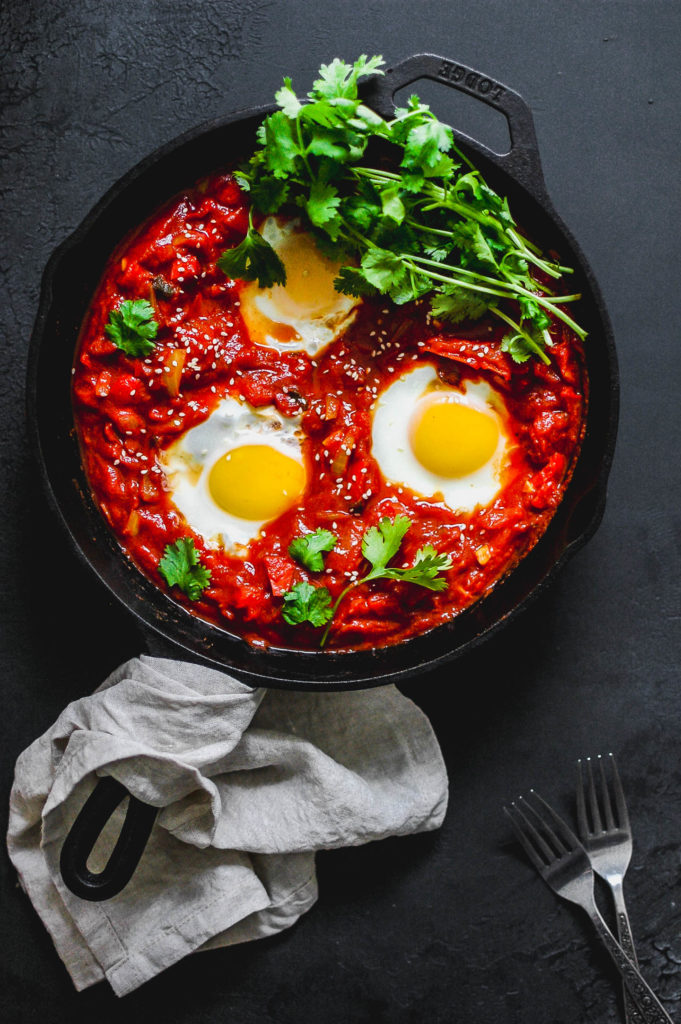
Traditional shakshuka originated in North Africa. Tunisia is said to be its birthplace, but it is quite popular in the Middle East and many other places.
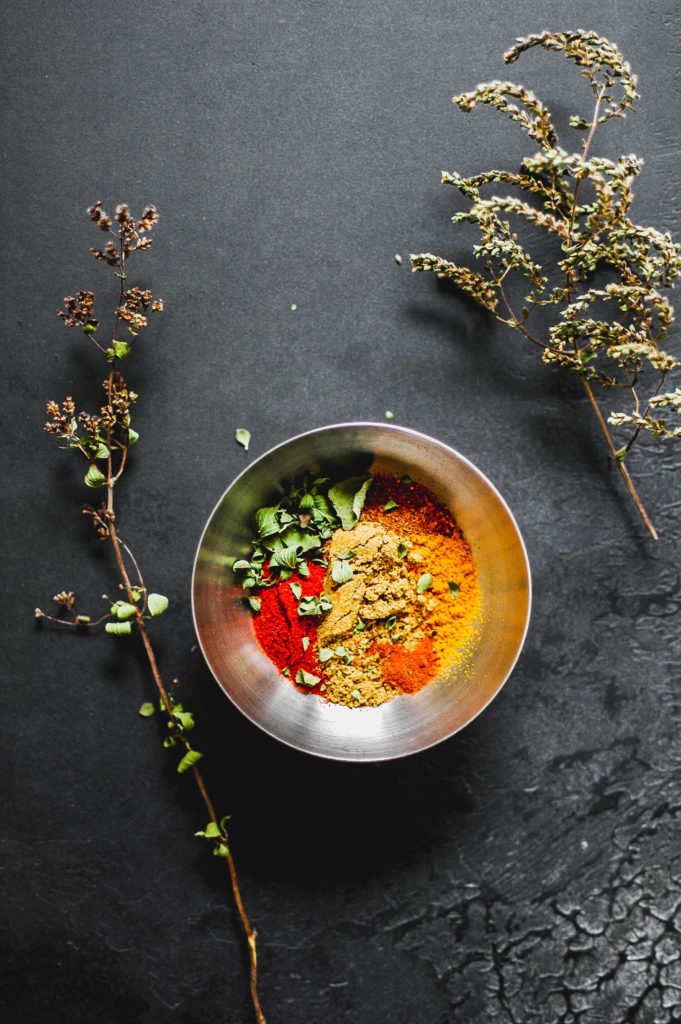
There is nothing better than a relaxed, savoury breakfast, especially when made with fresh, organic, seasonal ingredients, in my opinion. Arrabbiata happens to be my favourite Italian pasta dish, and shakshuka is a classic that has existed in Mediterranean cultures for centuries. Arrabbiata shakshuka (‘eggs in purgatory’) combines the two while keeping it gluten, nut and dairy free (unless you choose to garnish it with grass fed, pasture raised feta or sop up the sauce with organic sourdough… highly recommended).
It’s satiating and most nutritious when created with organic, local pasture raised eggs, poached with a soft yolk, perfect for breakfast, lunch or dinner… need I say more?
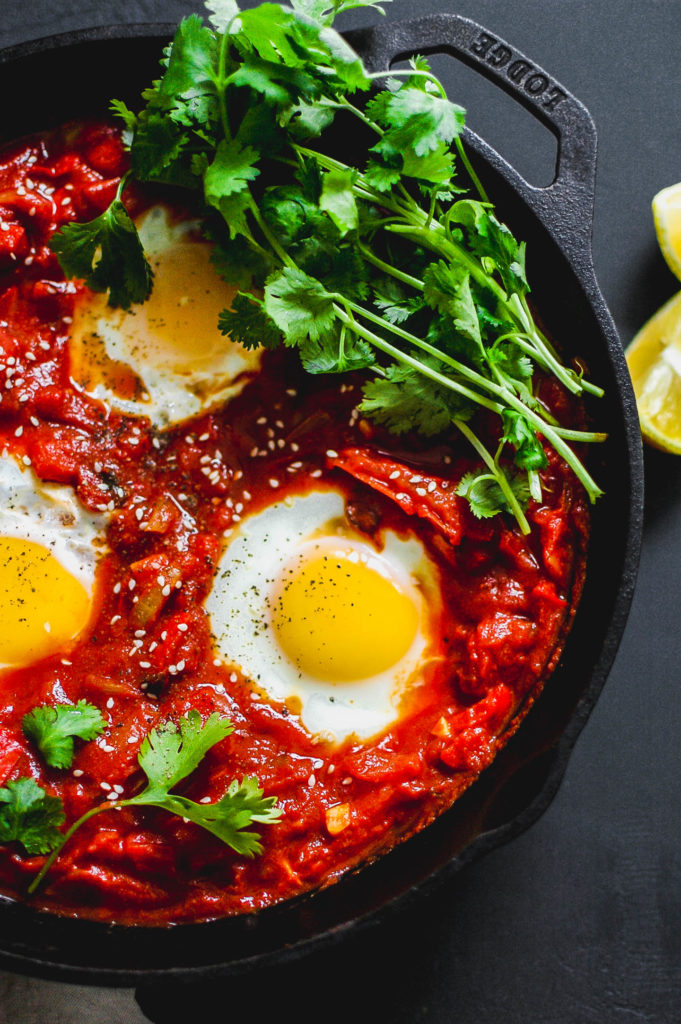
Tips for making the Very Best arrabbiata shakshuka (‘eggs in purgatory’):
The only really tricky part about making arrabbiata shakshuka (‘eggs in purgatory’) is cooking the eggs just right. When you crack them directly into the simmering sauce, it’s easy for them to go from uncooked to totally overcooked. All you have to do is keep an eye on them until they cook to your preference.
I prefer the eggs with set whites and soft yolks so that when you cut into it, the yolk breaks and mingles with the sauce. Here are a few possible ways to achieve it, along with other tips to get the most out of your shakshuka.
- Control the temperature. The eggs will start cooking as soon as they hit the simmering tomato sauce. To even out the cooking time for all eggs involved, remove the skillet from the heat before cracking in the eggs and returning the skillet to a gentle simmer at medium-low heat.
- Control the spice as you please. I usually add a pinch of ground cayenne but I often also include chopped jalapeños, serranos, or another variety of hot pepper to make it spicier.
- Spoon some of the sauce over the egg whites. After breaking the eggs into the sauce, carefully spoon some of the sauce over just the whites. This helps the whites cook faster so they set before the yolks overcook.
- Cover with a lid and rotate. I highly recommend this. Covering the skillet with a lid allows the eggs to steam cook with an increased even distribution of heat. Keep an eye on it and rotate the pan as needed for the eggs to cook evenly since stove tops can have hot spots. As soon as the whites are set and the eggs jiggle a bit in the center, they’re done. This usually takes 5-6 minutes at medium heat on my stove.
- Substitute the eggs with sprouted organic tofu slices, or add in 1 cup of sprouted chickpeas, if you prefer. You can also turn it from a shakshuka into a vegetable stew and include sweet potato cubes or sprouted beans. Just simmer them for 10 minutes to cook through.
- Prepare the sauce in advance so you can simply heat it up and crack the eggs in when you’re short on time.
- For the sauce, use whatever tomatoes you like. Crushed organic tomatoes or passata from a glass jar tends to work nicely, but 4-5 medium tomatoes chopped and thrown into a blender with 1/4 cup of water into a pulp will also work, especially when they’re fresh from the garden, bursting with life force.
- Use a splash of high quality organic balsamic vinegar if you want an extra depth to the flavours. Optional, but I highly recommend this. Acropolis is personally my favourite brand for both balsamic vinegar and olive oil (affiliate links). I wholeheartedly swear by this stuff, but any organic/biodynamic brand you can find will do nicely.
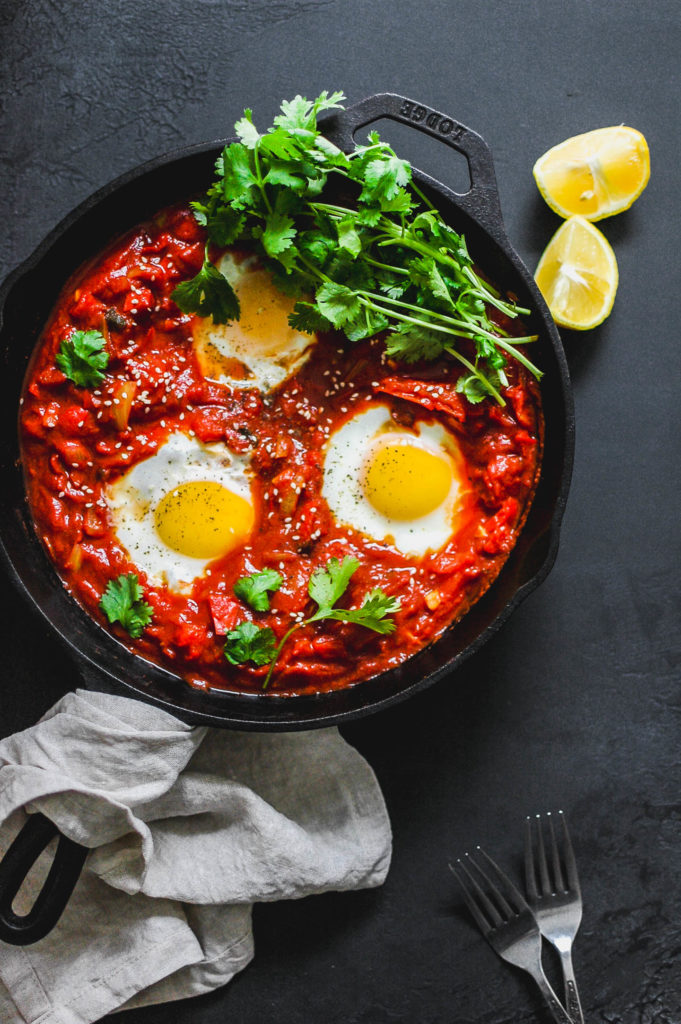
On Eggs
We’ve known for years about the massive health benefits of Mediterranean inspired diets, and this dish is certainly no exception. Don’t let ideological fad diet misinformation get to you: pasture raised, locally sourced organic eggs can be a superfood in themselves with their highly bioavailable nutrient density. In fact, they’ve actually played a role in reversing my own hormonal imbalances induced from even the most conscientious organic whole food plant based veganism that I practiced for a few years. They just feel really good for me. We are all unique, so you’ll have to experiment for yourself, though.
What’s so convenient about shakshuka is that the eggs in this dish can be poached as much or as little as you like. The yolks carry the most nutrients when soft. In fact, both cooked and raw eggs are a source of 100% complete nutrition for humans, highly beneficial for the gut biome and a source of choline, high quality complete protein and healthy cholesterol with raw egg whites containing antibacterial, antiviral and antifungal properties, and many of its numerous health benefits even get lost when the egg is fully cooked or consumed with a form of sucrose that imbalances the gut biome. (If you’re new to consuming completely raw eggs—hello, eggnog—start off small as your gut microbiome adjusts, and avoid consuming with sucrose/sugars as it’ll throw off the balance of the gut flora).
The WHO and other public health organizations actually use eggs as their reference standard for evaluating the protein quality in all other foods. You may have even seen bodybuilders, health nerds or biohackers safely consume completely raw organic pasture raised eggs for nourishment, so what I’m getting at is that there’s no need for fear or guilt when it comes to this recipe, especially if you stick to high quality, pasture raised, local organic eggs to avoid antibiotics or chemicals from poor care and living conditions AND eliminate gut microbiome destroying foods including alcohol, bread, and refined sucrose. If consuming raw or cooked eggs makes you feel good and if you experience their potentially brain boosting benefits, then you’ll know if they’re right for you. You can read more about raw egg consumption in particular here, here and here.
Did you know that the composition of eggshells actually resembles our teeth? Don’t be afraid to make use of the whole egg or even peel off and include pieces of the inner membrane while cooking—#zerowastegoals! Even eggshells are edible when you crush them up into a fine powder, and the inner membrane is a precious source of collagen, one of the most important food sources of proteins that improves skin quality and wound healing, and even remineralization of the teeth. The (rinsed) eggshell membrane can also be placed over wounds to help them heal faster with its amino acid profile. I usually peel them off the shells and place them in the shakshuka to consume. Yum, collagen.
To keep things simple and to get a well rounded nutrient profile over time, I advise changing it up and cooking eggs in different ways using different recipes whenever you feel like it.
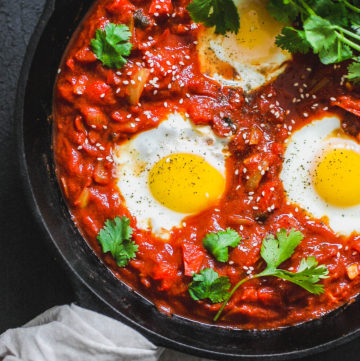
Arrabbiata Shakshuka (Eggs in Purgatory)
Ingredients
- 1 tbsp extra virgin organic olive oil or cooking fat of your choice such as grass fed tallow, butter, ghee, or coconut oil
- 1 medium organic onion, fine dice
- 1 medium organic bell pepper, diced
- 1 organic hot pepper, such as jalapeño, serrano, etc. optional
- 1 tbsp fresh or dried organic oregano
- 1 tsp organic ground cumin
- 1 tsp organic ground turmeric
- 2 tsp organic paprika
- 1/4 tsp organic chili powder
- 1/8 tsp organic cayenne optional
- 1 tsp sea salt
- 1 tsp organic balsamic vinegar
- 1 tbsp organic tomato paste optional
- 3 cloves organic garlic, minced + optional extra raw pieces for garnish
- 1 medium organic tomato, chopped
- 2 cups crushed tomatoes/passata OR 4-5 medium tomatoes blended with 1/4 cup filtered water into a pulp, seeds removed
- 1/2 cup filtered water as needed to thin out the sauce
- 3-6 pasture raised eggs
- freshly cracked organic black pepper, to taste
- organic olives, organic sauerkraut, organic arugula, organic parsley, toasted dukkah, freshly squeezed organic lemon juice, and/or organic cilantro to garnish
- organic sourdough bread for serving optional
Instructions
- Heat the olive oil in a skillet over medium heat. Add the onions and bell peppers (and hot peppers, if using), and sauté until the onions are quite soft and translucent, about 3-4 minutes.
- Add the sea salt, oregano, cumin, turmeric, paprika, chili powder (and cayenne, if using), and stir. Keep stirring until spices are fragrant, about 30 seconds. Add the splash of balsamic vinegar and tomato paste, and stir again to combine.
- Add in the garlic and chopped tomato, and continue stirring until fragrant for about 30 more seconds, scraping up any browned bits from the bottom of the skillet.
- Pour in the crushed tomatoes and filtered water to thin the sauce out if needed. Raise the heat to medium high and give the mixture another few stirs to combine, about 1 minute to allow the sauce to heat up.
- Turn heat down to low to prepare cracking the eggs in. Using a spoon or your cooking utensil, create as many indentations in the tomato sauce as you have eggs that you're cooking. Crack the eggs into the holes, raise the heat back up to medium, and cover the skillet with a lid to allow them to steam cook for 5-6 minutes, or until the eggs are fully white.
- Remove from heat once the eggs are ready. Serve with garnishes and toasted sourdough!
